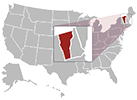
A veterinary clinic, animal hospital, or lab is a terrific career option for candidates who possess strong interpersonal communication skills, work well with others, and are kind, caring, and competent.
Candidates must function well under pressure, enjoy working around animals, be detail-oriented, and have excellent office skills.
The role of vet office manager is the complete package and the cat’s meow!
Page Navigation
- Vet Office Manager Duties in Vermont
- Licensing Requirements to Become a Vet Office Manager in Vermont
- Vet Office Manager Programs
- Salary
- Frequently Asked Questions
- Does the Green Mountain State have an official animal?
- My significant other and I live in Vermont. We want to get a new furbaby, and we’re divided between Team Cat and Team Dawg. That got us wondering about others. Vermonters seem like people who like and respect nature. So, my question is twofold: How many folks have pets, and what’s the proportion of cat to dog households?
- I earned my certifications long ago. Is there anything I should know, or do I need certifications?
Vet Office Manager Duties in Vermont
The manager is the liaison between clients, the office administrative staff, the medical team, and the pets.
The position involves administrative, customer care, and vet office management.
The office manager in the animal clinic or pet hospital oversees human resources, staff scheduling, training, and administrative staff oversight.
A high school degree or equivalency is the minimum educational entry requirement to become an office vet manager.
Some candidates pursue an associate’s or bachelor’s degree to further their careers.
Two typical paths candidates often take are business administration and veterinary medicine.
Experience
It’s the classic conundrum of you can’t get a job without experience, yet you can’t get experience without a job.
The workaround for the first job: education, skills, and experience.
This is especially true when attaining the first position in the animal care industry.
Consider:
- Taking programs and classes that offer internships.
- Volunteer at an animal shelter or hospital.
- Work in an office.
Licensing Requirements to Become a Vet Office Manager in Vermont
The goal: Attain a position as a vet office manager.
Take the reins and reach the office manager position at an animal hospital, clinic, lab, shelter, or other environment that cares for creatures great and small.
This role of vet office manager usually requires at least several years of experience working with animals, excellent office skills, and knowledge of office software programs.
Both skill sets are a fantastic combination!
Helping people care for their pets and running the animal clinic is the complete package for the candidate who wants to use their talents, organizational skills, and calm compassion to help their community care for their animal companions.
While Vermont doesn’t have formal requirements for mandatory licensing and certification, certification of formally recognized classes and years of experience in receiving structured, supervised environments are helpful to candidates for knowledge, skills, confidence, and references.
Certification
What about Certification?
What does that do for a candidate’s chance of landing a job?
While not mandatory, certification is beneficial because it shows history and references and increases the chance of landing the perfect job.
The Veterinary Hospital Managers Association Certification is available for veterinary office managers through the VHMA program, and the exam is offered.
While it’s optional, VHMA membership comes with benefits such as sitting the exam:
- $675 for VHMA members
- $825 for non-members
- Qualifications to sit the Certified Veterinary Practice Manager exam:
- Minimum of 3 years in a related field.
- 18 credit hours in a business management-related program.
- 48 hours of continuing education courses through a college or professional organization.
- Four letters of recommendation.
Vet Office Manager Programs

1. Vermont State University
The Veterinary Office Manager course prepares candidates to manage the business side of a veterinary practice as an office manager.
Along with office management training, the course includes introductory veterinary assistant training.
Plus, candidates learn to use QuickBooks, providing vital skills.
The course trains for certification exams.
Students receive test vouchers.
Learn:
- Anatomy and physiology.
- Fundamentals of nutrition, vaccinations.
- Basic animal care techniques.
- Assisting during surgery and dental procedures.
- Managing medical records.
- Communication skills.
- Microsoft Office Word and Excel.
- Professional communication skills and office etiquette.
- Essential bookkeeping tasks and principles using QuickBooks.
Contact Information
- Address: Vermont State College/575 Stone Cutters Way, Montpelier, VT 05602
- Phone: 802-728-1100
- Website: https://vermontstate.edu/

2. Penn Foster
Veterinary Practice Management — online and self-paced.
Seven major courses culminate in 19 credits.
Courses taught by veterinary professionals range from business ethics to management principles.
Website: https://www.pennfoster.edu/programs/veterinary/veterinary-practice-management-certificate
Top 2 Schools in Vermont
| School Name | Address |
|---|---|
| Vermont State College | 575 Stone Cutters Way, Montpelier, VT 05602 |
| Penn Foster | 3133 W Frye Rd Suite 215, Chandler, AZ 85226, United States |
Salary
A vet office manager in Vermont earns around $86,00 annually.
The typical salary ranges from $77,00 to $97,00, with most in the industry earning between $70,00 and $107,00.
Annual Salary Range:Average Salary of Vet Office Managers in Vermont
| City Name | Salary |
|---|---|
| Barre | $88,087 |
| Montpelier | $88,087 |
| Bennington | $89,099 |
| Rutland | $88,457 |
| Burlington | $88,879 |
| Colchester | $88,879 |
| Williston | $88,879 |
| Essex | $88,879 |
| Essex Junction | $88,879 |
| South Burlington | $88,880 |
Regional Salary in Vermont
| Region | Employed | Avg. Annual Salary | Avg. Hourly Pay | Top 10% Annual Salary | Bottom 10% Annual Salary |
|---|---|---|---|---|---|
| Burlington-South Burlington, VT | 180 | $100,020 | $48.09 | $158,620 | $66,360 |
* Employment conditions in your area may vary.
Frequently Asked Questions
Does the Green Mountain State have an official animal?
Yes!
In 1961, the Morgan horse rode into the hearts of Vermont residents and enthusiastic visitors alike.
My significant other and I live in Vermont. We want to get a new furbaby, and we’re divided between Team Cat and Team Dawg. That got us wondering about others. Vermonters seem like people who like and respect nature. So, my question is twofold: How many folks have pets, and what’s the proportion of cat to dog households?
Fantastic question!
The answer to the first part of your question is easy — approximately 70% of Vermont households harbor a pet and its companion homeowners.
Dogs and cats?
Or cats and dogs?
Maybe the cold weather puts the brakes on more dog cohabitation, or perhaps Vermonters admire the cat’s independence, meticulous habits, and frank nature, but the stats break down to:
- 28.3% of Vermont homes house a dog.
- 44.6% of Vermont households hold a cat.
I earned my certifications long ago. Is there anything I should know, or do I need certifications?
First, congratulations are in order!
To maintain their Certification, they must earn at least 48 professional development credits and pay the $210 recertification fee.




